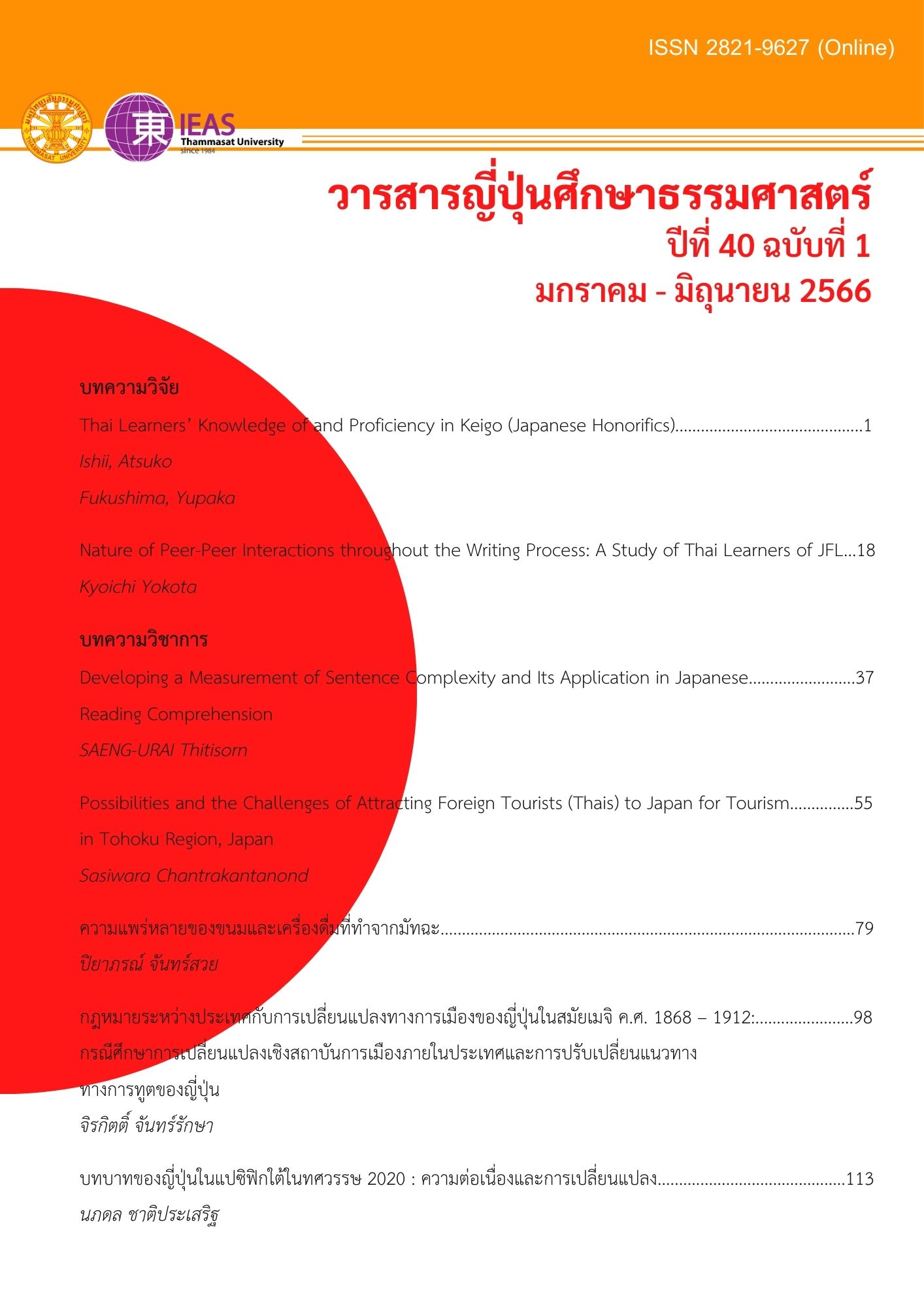International Law and Political Changes in Japan during the Meiji Era (1868-1912): A Case Study of Political Institutional Changes and Adjustment to Diplomatic Affairs
Keywords:
International law, International society, Modernization, Western nations, Japan politicsAbstract
This study aims to find how international law that comes along with the expansion of western power affected Japan to domestic institutional changes and diplomatic changes. The study was divided into two parts: 1) the study of the influence of international law on changes in domestic political institutions and 2) the study of the influence of international law on the transformation of Japanese diplomacy in foreign nations by using indicators related to the standard of civilization. The study found that international law was the catalyst for Japan during the Meiji period to develop into Modernization. The domestic dimension had a systematic political structure application to civil rights principles and Western values within the country. The foreign extent, complied with international law, and the adaptation of international law to the law of war, established a permanent diplomatic system with Western nations. The development was undertaken to create Western recognition as a civilized and modern nation-state and as part of the international society with the western nations.
Downloads
References
ศิริพร ดาบเพชร. (2559). ญี่ปุ่นกับการสร้างจักรวรรดินิยม. ภาควิชาประวัติศาสตร์ มหาวิทยาลัยศรีนครินทรวิโรฒ.
ศิริพร ดาบเพชร. (2562). ประวัติศาสตร์เอเชียตะวันออกสมัยใหม่. ภาควิชาประวัติศาสตร์ มหาวิทยาลัยศรีนครินทรวิโรฒ.
Earl of Elgin., & Bruce, J. (1859). Correspondence relative to the Earl of Elgin's Special Missions to China and Japan. Harrison and Sons. https://www.google.co.th/books/edition/Correspondence_Relative_to_the_Earl_of_E/-2M9AAAAMAAJ?hl=en&gbpv=0
Fairbank, J. K., Reischauer, E. O., & Craig, A. M. (1977). East Asia: The Modern Transformation (ศรีสุข ทวิชาประสิทธิ์, ผู้แปล). ไทยวัฒนาพานิช (Original work published 1965).
Gong G. A. (1984). The Standard of 'Civilization' in International Society, Oxford University Press.
Ito, M. (n.d.). The Constitution of the Empire of Japan. https://www.ndl.go.jp/constitution/e/etc/c02.html#s2
Japan Center for Asian Historical Records (JACAR). (n.d. a). Sino-Japanese Peace Treaty / Treaty of Shimonoseki. https://www.jacar.go.jp/english/jacarbl-fsjwar-e/smart/glossary/g004.html
Japan Center for Asian Historical Records (JACAR). (n.d. b). The Anglo-Japanese Alliance https://www.jacar.go.jp/nichiro/uk-japan.htm
Métraux, D. A. (2011). Democratic Trends in Meiji Japan. Education About Asia, 16(1). https://www.asianstudies.org/publications/eaa/archives/democratic-trends-in-meiji-japan/
Murase S. (1976). The Most-Favored-Nation treatment in Japan’s treaty practice during the period 1854-1905. The American Journal of International Law, 70(2), 273-297. https://doi.org/10.2307/2200073
National Diet Library, (n.d.). Iwakura Mission. https://www.ndl.go.jp/modern/e/cha1/description07.html
Schwarzenberger, G. (1955). The Standard of Civilisation in International Law. Current Legal Problems, 8(1), 212-234.
The Gazette Official Public Record, (1859a). The London Gazette Issue: 22226 https://www.thegazette.co.uk/London/issue/22226/page/453/
The Gazette Official Public Record, (1859b). The London Gazette Issue: 22236 https://www.thegazette.co.uk/London/issue/22236/page/989
Downloads
Published
Issue
Section
License
Copyright (c) 2023 Thammasat Journal of Japanese Studies

This work is licensed under a Creative Commons Attribution-NonCommercial-NoDerivatives 4.0 International License.




